
Scooby-Doo is an American media franchise owned by Warner Bros. Entertainment and created in 1969 by writers Joe Ruby and Ken Spears through their animated series, Scooby-Doo, Where Are You!, for Hanna-Barbera. The series features four teenagers: Fred Jones, Daphne Blake, Velma Dinkley, and Shaggy Rogers, and their talking Great Dane named Scooby-Doo, who solve mysteries involving supposedly supernatural creatures through a series of antics and missteps, while traveling using a brightly colored van called the "Mystery Machine". The franchise has several live-action films and shows.

Hanna-Barbera was an American animation studio and production company, which was active from 1957 until its absorption into Warner Bros. Animation in 2001. Founded on July 7, 1957 by Tom and Jerry creators William Hanna and Joseph Barbera, it was headquartered on Cahuenga Blvd from 1960 to 1998, then subsequently at the Sherman Oaks Galleria in Sherman Oaks. In 1958, The Huckleberry Hound Show debuted, then The Flintstones, The Yogi Bear Show, The Jetsons, Jonny Quest, Wacky Races, Scooby-Doo, Where Are You! and The Smurfs followed.

Mark Stephen Evanier is an American comic book and television writer, known for his work on the animated TV series Garfield and Friends and on the comic book Groo the Wanderer. He is also known for his columns and blog News from ME, and for his work as a historian and biographer of the comics industry, such as his award-winning Jack Kirby biography, Kirby: King of Comics.

Ruby-Spears Productions was an American entertainment production company that specialized in animation based in Burbank, California, with another branch in Rome, Italy. The company was founded in 1977 by veteran writers and Scooby-Doo, Where Are You! creators Joe Ruby and Ken Spears.
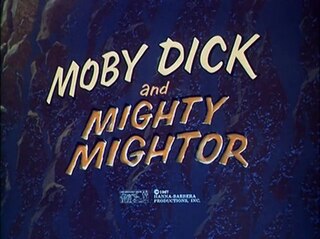
Moby Dick and Mighty Mightor is an American Saturday morning animated television series produced by Hanna-Barbera Productions that ran on CBS from September 9, 1967 to January 6, 1968, airing in reruns until September 6, 1969. Despite Moby's name coming first, he had only one short per half-hour episode, sandwiched between two with Mightor. The same structure was used the previous season for Frankenstein Jr. and The Impossibles.

Josie and the Pussycats is an American animated television series based upon the Archie Comics comic book series of the same name created by Dan DeCarlo. Produced for Saturday morning television by Hanna-Barbera Productions, 16 episodes of Josie and the Pussycats aired on CBS during the 1970–71 television season and were rerun during the 1971–72 season.
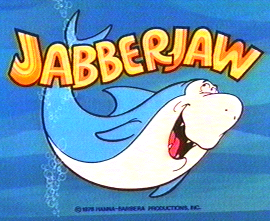
Jabberjaw is an American animated television series created by Joe Ruby and Ken Spears and produced by Hanna-Barbera which aired 16 original episodes on ABC from September 11 to December 18, 1976. Reruns continued on ABC until September 3, 1978.

The New Scooby-Doo Movies is an American animated mystery comedy television series produced by Hanna-Barbera for CBS. It is the second television series in Scooby-Doo franchise, and follows the first incarnation, Scooby-Doo, Where Are You! It premiered on September 9, 1972, and ended on October 27, 1973, running for two seasons on CBS as the only hour-long Scooby-Doo series. Twenty-four episodes were produced, sixteen for the 1972–73 season and eight more for the 1973–74 season.

Help! ... It's the Hair Bear Bunch! is an American animated television series, created by Joe Ruby and Ken Spears and produced by Hanna-Barbera, which originally aired for one season on CBS from September 11, 1971, to January 8, 1972. Daws Butler, Paul Winchell and William Callaway voice the three bears that comprise the Hair Bear Bunch, while John Stephenson and Joe E. Ross voice Mr. Eustace Peevly and Lionel Botch, respectively, the two individuals who patrol the zoo in which the bears live. The series' producer was Charles A. Nichols, with William Hanna and Joseph Barbera directing, and Hoyt Curtin serving as the composer.

Jeannie is an American animated television series that originally aired for a 16-episode season on CBS from September 8 to December 22, 1973. It was produced by Hanna-Barbera in association with Screen Gems, and its founders William Hanna and Joseph Barbera are the executive producers. Despite being a spin-off of sorts of the television sitcom I Dream of Jeannie, Jeannie has little in common with its parent show. In this version, the title character is rescued on the beaches of southern California by a high school student, Corey Anders. Jeannie is accompanied by genie-in-training Babu, and they become companions to Corey and his best friend, Henry Glopp, both of whom also help Jeannie and Babu adjust to their new home as well as life in Los Angeles. The series was marketed towards a younger demographic than I Dream of Jeannie.

Goober and the Ghost Chasers is an animated television series produced by Hanna-Barbera Productions, broadcast on ABC from September 8 to December 22, 1973. A total of 16 half-hour episodes of Goober and the Ghost Chasers were produced. It was later serialized as part of the syndicated weekday series Fred Flintstone and Friends during 1977–78. On cable, it was shown as part of USA Cartoon Express and on Boomerang starting in 2000.

Space Ghost is an American Saturday morning superhero animated television series produced by Hanna-Barbera Productions, first broadcast on CBS from September 10, 1966, to September 16, 1967, and continued reruns until September 7, 1968. The series was composed of two unrelated segments, Space Ghost and Dino Boy in the Lost Valley. The series was created by Alex Toth and produced and directed by William Hanna and Joseph Barbera. Sometimes, it is alternatively called Space Ghost & Dino Boy to acknowledge the presence of both shows.

Scooby-Doo, Where Are You! is an American animated comedy television series created by Joe Ruby and Ken Spears and produced by Hanna-Barbera for CBS. The series premiered as part of the network's Saturday morning cartoon schedule on September 13, 1969, and aired for two seasons until October 31, 1970. In 1978, a selection of episodes from the later animated series Scooby's All-Star Laff-A-Lympics and The Scooby-Doo Show were aired on ABC under the Scooby-Doo, Where Are You! title name, and was released in a DVD set marketed as its third season. It also aired on BBC One in the UK from 1970 to 1973. The complete series is also available on Boomerang, Max, and Tubi streaming services.
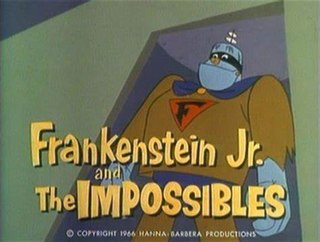
Frankenstein Jr. and The Impossibles is an American animated television series produced by Hanna-Barbera Productions. It premiered on September 10, 1966 on CBS, and ran for two seasons on Saturday mornings.

Valley of the Dinosaurs is an American animated television series produced by the Australian studios of Hanna-Barbera Productions and broadcast on CBS from September 7 to December 21, 1974, and in syndication from 1977 to 1983. The series, about a contemporary family sucked by a vortex back to the Stone Age was intended to be educational as well as entertaining, demonstrating the early human uses of fire, clothing, weapons and cooking. It debuted on the same day as Land of the Lost.
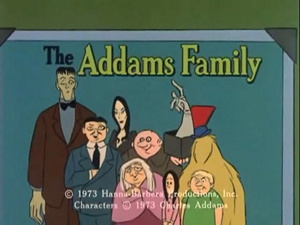
The Addams Family is an American animated sitcom adaptation of the Charles Addams single-panel comic for The New Yorker. The show was produced by Hanna-Barbera Productions for Saturday mornings in 1973, and was later rebroadcast the following season. Jackie Coogan and Ted Cassidy, who played Uncle Fester and Lurch, respectively, in the 1960s television series, returned in voice-over roles. The cast also included 10-year-old Jodie Foster, who performed the voice of Pugsley Addams. The show's theme music was completely different and had no lyrics or finger snapping, but retained a recognizable part of the four-note score from the live-action series.

Dumb and Dumber is an animated series produced by Hanna-Barbera and New Line Television for ABC. It is based on the 1994 comedy film of the same name. It premiered in October 1995, making it the last Hanna-Barbera show to air on a television channel other than Cartoon Network.
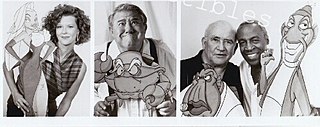
Fish Police is an American adult animated television series produced by Hanna-Barbera for CBS. It is based on the comic book series of the same name created by Steve Moncuse. It first aired in 1992, broadcasting three episodes before being axed for low ratings. A further three episodes never aired in the United States, although the entire series ran in European syndication.
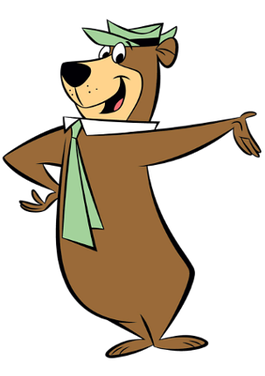
Yogi Bear is an anthropomorphic animal character who has appeared in numerous comic books, animated television shows, and films. He made his debut in 1958 as a supporting character in The Huckleberry Hound Show.

Laff-A-Lympics is an American animated comedy television series produced by Hanna-Barbera. The series premiered as part of the Saturday-morning cartoon program block Scooby's All-Star Laff-A-Lympics which consists of 24 episodes, on ABC in 1977. The show is a spoof of the Olympics and the ABC primetime series Battle of the Network Stars, which debuted one year earlier. It featured 45 Hanna-Barbera characters organized into teams which competed each week for gold, silver, and bronze medals. In each episode, the Really Rottens would try in each event to cheat only to get caught by Snagglepuss each time. One season of 16 episodes was produced in 1977–78, and eight new episodes combined with reruns for the 1978–79 season as Scooby's All-Stars. Unlike most cartoon series produced by Hanna-Barbera in the 1970s, Laff-A-Lympics did not contain a laugh track. Scooby’s Laff-a-Lympics was originally owned by Taft Broadcasting, Warner Bros. Domestic Television Distribution currently owns the series through its two in-name-only units, Warner Bros. Family Entertainment and Turner Entertainment.




















